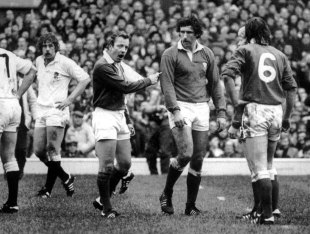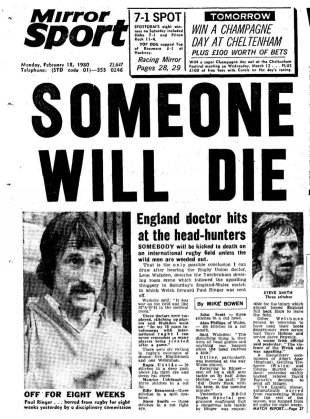|
England 9-8 Wales, Five Nations, Twickenham, 1980
Ringer's dismissal on a day of shame
ESPN Staff
February 16, 1980

Into the hall of infamy: Paul Ringer gets his marching orders
© Getty Images Enlarge
England beat Wales 9-8, their first win against them since 1974, thanks to three penalties from Dusty Hare, although the match hinged on Paul Ringer's 13th-minute dismissal for a late tackle. For more than an hour Wales battled on with grim - and often brutal - determination, even reaching half-time 4-3 ahead, but in the end the boot of Hare proved decisive. Wales came into the match on the back of a win against France which had been less than inspiring with the usually brilliant forwards coming under fire for an insipid first-half display. England had more convincing victories over Ireland and France under their belt and the media had been cautiously optimistic that Wales were there for the taking. A classic was predicted but it turned out to be what the Times lamented was a "wretched advertisement for the game of rugby". Given the hype and the history, the opening exchanges were predictably brutal. Within a minute John Scott, England's No.8, was exchanging blows with Ringer and thereafter the backs were at each others' throats. In the seventh minute Roger Uttley claimed Ringer had kneed Hare in the back. "I was in so much pain I almost left the field at half time," Hare said. The match was barely ten minutes old when David Burnett, the Irish referee, summoned both captains and told them he would have to act were they not able to control their players. "It was like World War Three but in them days referees didn't tend to send players off, no matter what they did," said Wales prop Graham Price. "It was all going on and then eventually all the players had a warning." Almost immediately Ringer was guilty of a late tackle - with a little elbow thrown in for good measure - on England fly-half John Horton and Burnett immediately sent him off. He was the first player to be dismissed at Twickenham in an international for 55 years. "I wasn't shamming when I went down," Horton said. "Paul elbowed me after the ball had gone." "I went in fast and put my hands up to try to charge down the kick," Ringer countered, but he admitted he was "not surprised to be sent off … it was a cauldron out there". But he admitted the referee had his work cut out. "The game had such an explosive start he had no choice. I've got no hard feelings against him." Burnett handed out 35 penalties during the afternoon. England failed to make the extra man count, Wales taking the lead within two minutes of Ringer's departure when Jeff Squire pounced on a fumble. Davies missed a straightforward conversion, one of seven failed kicks from four different Welsh players which ultimately proved decisive. Hare was almost as fallible, missing a brace of opportunities in each half. The second half was attritional, both sides kicking for territory and then allowing their forwards to try to grind down their opposition. England appeared to come off worse. Utley was replaced at half time needing ten stitches when kicked off the ball, while four others players needed patching up by the overworked doctor. Lest it be thought Wales were the sinners, England gave as good as they got.

The press pile in
© Getty Images
Enlarge
Five minutes from the end Hare finally slotted a penalty to put England 6-4 ahead, but Wales refused to give up, and with two minutes of normal time remaining Alan Phillips charged down a Steve Smith kick, gathered the loose ball and set up Elgan Rees for what appeared the winning score. But deep into stoppage time Wales were penalised in a ruck and Hare calmly slotted the wide-angled kick. England's celebrations were muted and the reaction in the press was damning of the Welsh tactics. In the Times Peter West wrote that at least two of their side should have shared Ringer's fate. In the Daily Express Tony Bodley said the "first-half brutality and bloodshed shamed the game". Lord Wakefield, who had captained England to their Grand Slam in 1924, said he had "never seen a game which had done more harm to the game of rugby … it was an absolute shocker". The Welsh Rugby Union immediately announced Ringer would not be picked for the remainder of the season, and the following day an international disciplinary committee banned him for eight weeks. In effect it was the end for him and he only played one more game for his country. England went on to beat Scotland four weeks later, securing their first Grand Slam since 1957 and only their second since 1928. Wales beat the Scots but lost their final game in Dublin. © ESPN Sports Media Ltd.
| |||||||||||||||
Live Sports
Communication error please reload the page.
-
Football
-
Cricket
-
Rugby
-
- Days
- Hrs
- Mins
- Secs
F1 - Abu Dhabi GP
Abu Dhabi Grand Prix December 11-131. Max Verstappen ()
2. Valtteri Bottas (Mercedes)
3. Lewis Hamilton (Mercedes)
4. Alexander Albon ()
5. Lando Norris ()
6. Carlos Sainz Jr ()
-
ESPNOtherLive >>
Boxing - Nelson v Wilson; Simmons v Dickinson; Joshua v Gavern (Metro Radio Arena, Newcastle)
Golf - Houston Open
Snooker - China Open
Tennis - Miami Open

